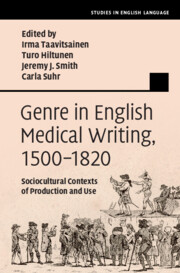Book contents
- Genre in English Medical Writing, 1500–1820
- Studies in English Language
- Genre in English Medical Writing, 1500–1820
- Copyright page
- Contents
- Figures
- Image Gallery
- Tables
- Notes on Contributors
- Preface
- Acknowledgements
- Chapter 1 Medical Discourse and Sociocultural Contexts 1500–1820
- Chapter 2 John Arderne’s Afterlife in Manuscript and Print
- Chapter 3 John Mirfield’s Gouernayl of Helþe
- Chapter 4 Surgical Handbooks Translated into Low German
- Chapter 5 Tracing the Early Modern John of Burgundy
- Chapter 6 The Plague in Southern Italy in 1815–1816
- Chapter 7 On Excitability
- Chapter 8 Systems and Centos
- Chapter 9 Medical Vocabulary in English Romantic Literature
- Chapter 10 Foreign Ingredients in Early and Late Modern English Recipes
- Chapter 11 Walter Bailey’s (1529–1593) Medical Genres
- Chapter 12 London Bills of Mortality of the Seventeenth Century
- Chapter 13 Advertising Proprietary Medicines in Pamphlets
- Chapter 14 Persuasion in Hungarian Medical Recipes
- Chapter 15 Persuasion in Early Modern English Medical Recipes
- Chapter 16 Richard III
- Chapter 17 Images and Paratexts
- Preface to the Image Gallery
- Image Gallery
- Index
- References
Chapter 8 - Systems and Centos
Some Eighteenth-Century Dictionaries
Published online by Cambridge University Press: 13 October 2022
- Genre in English Medical Writing, 1500–1820
- Studies in English Language
- Genre in English Medical Writing, 1500–1820
- Copyright page
- Contents
- Figures
- Image Gallery
- Tables
- Notes on Contributors
- Preface
- Acknowledgements
- Chapter 1 Medical Discourse and Sociocultural Contexts 1500–1820
- Chapter 2 John Arderne’s Afterlife in Manuscript and Print
- Chapter 3 John Mirfield’s Gouernayl of Helþe
- Chapter 4 Surgical Handbooks Translated into Low German
- Chapter 5 Tracing the Early Modern John of Burgundy
- Chapter 6 The Plague in Southern Italy in 1815–1816
- Chapter 7 On Excitability
- Chapter 8 Systems and Centos
- Chapter 9 Medical Vocabulary in English Romantic Literature
- Chapter 10 Foreign Ingredients in Early and Late Modern English Recipes
- Chapter 11 Walter Bailey’s (1529–1593) Medical Genres
- Chapter 12 London Bills of Mortality of the Seventeenth Century
- Chapter 13 Advertising Proprietary Medicines in Pamphlets
- Chapter 14 Persuasion in Hungarian Medical Recipes
- Chapter 15 Persuasion in Early Modern English Medical Recipes
- Chapter 16 Richard III
- Chapter 17 Images and Paratexts
- Preface to the Image Gallery
- Image Gallery
- Index
- References
Summary
This chapter considers the characteristics and contexts of three eighteenth-century encyclopaedic dictionaries: Cyclopaedia (1728) by Ephraim Chambers, A medicinal dictionary (1742–45) by Robert James, and The first part of a dictionary of chemistry (1789) by James Keir, especially in relation to their own comments on their intentions. Chambers’s is generalist, while the other two are specialist works on medicine and chemistry. The Cyclopaedia had a long and acclaimed afterlife, while James’s dictionary was translated into French and Italian, but did not reach a second edition in England. Keir’s remained unfinished. An attempt is made to position these works in their larger lexicographical and scientific context, primarily through their paratexts.
Keywords
- Type
- Chapter
- Information
- Genre in English Medical Writing, 1500–1820Sociocultural Contexts of Production and Use, pp. 108 - 127Publisher: Cambridge University PressPrint publication year: 2022



